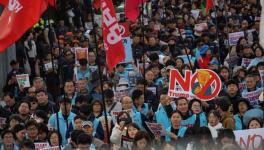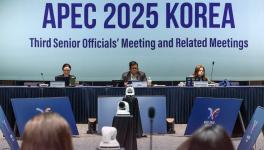Indonesia Spells Out Terms of Engagement with US
Indonesian President Joko Widodo (R) received US Secretary of State Mike Pompeo (L), Jakarta, October 29, 2020
On the eve of the US Secretary of State Mike Pompeo’s arrival in Jakarta on October 28, the senior editor of the leading Indonesian daily, Jakarta Post, Kornelius Purba wrote a taunting op-ed dwelling on what the heavyweight from Washington hoped to achieve in his mission at this late hour when an impression was gaining ground that Donald Trump might lose the November 3 election.
Clearly, Pompeo could afford to be away from his country. Which only meant he didn’t count in Trump’s politics and, even if Trump wins, Pompeo may not hold his current position.
Purba wrote, “Please don’t take it personally, when I consider your [Pompeo’s] efforts to involve Indonesia in your country’s confrontation with China, to be impossible mission. This is not because we are afraid of China, but Indonesia needs both the US and China, and Indonesia will forever keep its free and active foreign policy intact.”
At the joint news conference with Pompeo after the talks in Jakarta, Foreign Minister Retno Marsudi implied much the same when she said Indonesia wanted a “stable and peaceful” South China Sea where international law was respected, but also reminded Pompeo (twice) that her country pursued a “free and independent” foreign policy.
Retno wrote on Twitter that Indonesia sought with the US “a partnership between equals based on mutual respect and mutual benefits.” Jakarta has a testy maritime dispute with China. And “incidents” occur do now and then.
In fact, Retno alluded to it indirectly at the press conference by referring to the meeting of the Indonesian defence minister with his American counterpart in May in Washington where “they agreed to enhance defence cooperation, including by strengthening defence capabilities and military procurement to achieve minimum essential force, training and exercises, intelligence sharing, and maritime security cooperation in the region.”
Although Indonesian officials oppose China’s maritime claims, they have also expressed concern about Washington’s strident anti-China policies and rhetoric. This curious balancing spills over to public diplomacy as well. On the eve of Pompeo’s visit, the Jakarta Post featured an article by the Chinese envoy with the catchy title China-Indonesia ties: Surge forward with the tide of the times.”
Ambassador Xiao Xian wrote, “Undeterred by the epidemic, two-way trade between China and Indonesia have achieved continuous growth, which is a testament to the strong complementarities in our respective development as well as the strength and potential of bilateral ties…
“Nonetheless, we shall guard against any attempt to interfere or undermine the friendship between China and Indonesia. We are ready to work with the Indonesian side to act upon the fundamental and long-term interest of our two countries and peoples, resist external interference and stay steadily on the right course to continue to develop ties and win-win cooperation.”
The US has lost its pre-eminence in the ASEAN region. China has evicted it from that status. Symptomatic of the shift in tectonic plates is the refusal by Indonesia to accede to a US proposal to allow its P-8 Poseidon maritime surveillance planes spying on China in the South China Sea to land and refuel there.
An exclusive Reuters report said last week, Washington made “multiple “high-level” approaches in July and August to Indonesia’s defence and foreign ministers before President Widodo, “rebuffed the request.” One reason for Pompeo’s trip would have been to smoothen ruffled feathers. Neither side made any reference to the issue publicly.
Indeed, in the first half of 2020, China remains Indonesia’s largest trading partner and second-largest investor, with trade volume reaching $35.53 billion and Chinese investment growing by 172%. (In comparison, US-Indonesia trade is less than half of China’s.) The prestigious Jakarta-Bandung High-Speed Rail Project has finally got under way, and by September, despite the pandemic, construction progress reached 60%. (Project’s estimated cost in 2015 was put at $5.5 billion.)
The Regional Comprehensive Economic Corridors under China’s Belt and Road Initiative are also making steady progress. A total of 28 selected projects have now been presented to Chinese investors worth a whopping $91.1 billion — all infrastructure projects, including industrial parks, metallurgical and power plants, and tourism facilities.
Unsurprisingly, Pompeo came away empty-handed. Indonesia will do cherry-picking now. Purba wrote, “Indonesia, as well as all of ASEAN, needs a strong US military presence… Indonesia, however, never wants to form any security alliance despite regional rivalries.”
Pompeo wouldn’t have left a good impression. There was a “clash of civilisations” at the end of his visit. On October 29, Pompeo attended a dialogue on religion and civilisation in Jakarta, organised by the youth wing of Indonesia’s largest Islamic organisation, Nahdlatul Ulama.
For sure, in his hour-long speech, Pompeo didn’t miss the opportunity to make some atrocious references berating the “Iranian regime’s persecution of Baha’is, Christians, Sunni Muslims, and other minority groups” and the Chinese Communist Party’s “war against people of all faiths.”
The people of Java are famous for their old world courtesies and the audience listened in silence. But during the Q&A that followed, a student leader nailed Pompeo, ‘How do you and these Arab states plan to address the needs and aspirations of the Palestinian people?’
Pompeo went into a laborious argument — how, actually, Abraham Accords “enhances the capacity for the Palestinian people to have a state and to make the lives better for people all across the Middle East, certainly including the West Bank and the Gaza Strip and the Palestinians living there… we think the Abraham Accords sets the conditions where Arab states have now recognised that Israel has this right to exist. We hope the Palestinians will acknowledge that in the same way.”
But, realising he wasn’t reaching anywhere, Pompeo gave up, acknowledging upfront: “For an awfully long time – and I’ll finish with this thought – for an awfully long time, there was this idea that somehow the Palestinians had a veto which would prevent any conversation about stability and peace in the Middle East. We didn’t accept that premise.”
The adrenaline flow, perhaps, but Pompeo clean forgot in the bargain all about greeting his audience on the birthday of Prophet Muhammad, an important on the Muslim calendar. The point is, American ‘exceptionalism’ sucks.
Indonesia is the biggest country in the ASEAN grouping and a rising star among great powers. It is rapidly advancing on the path of development. Jokowi has embarked on an ambitious reform programme. He will not be deflected from his path by distractions such as the QUAD.
Jokowi’s approach is to be firm in safeguarding territorial integrity while opting for constructive engagement with China, which is the linchpin of his economic reform programme.
Jokowi was elected to power at the same time as India’s Narendra Modi but the contrast couldn’t be sharper — no hyperbole, no grandstanding, no boastful claims or false promises; instead, the low-profile statesman navigates his country’s economic ascendance as the top priority at this point in time on its development trajectory.
Jokowi’s meeting with Pompeo was largely devoted to economic issues. From February, Washington decided not to extend the Generalised System of Preferences facilities to Indonesia’s exports to the US market. Jakarta has since lobbied Washington but of no avail.
China is going to be a huge beneficiary in the tango with this Asian powerhouse (population: 270 million.) Jokowi’s reform programme is just what suits China for expanding its trade and investment opportunities in Indonesia and to build a brand new supply chain in the ASEAN region, which can withstand future shocks or vagaries of the world economy such as the coronavirus pandemic and be impervious to US pressure.
Courtesy: Indian Punchline
Get the latest reports & analysis with people's perspective on Protests, movements & deep analytical videos, discussions of the current affairs in your Telegram app. Subscribe to NewsClick's Telegram channel & get Real-Time updates on stories, as they get published on our website.
























